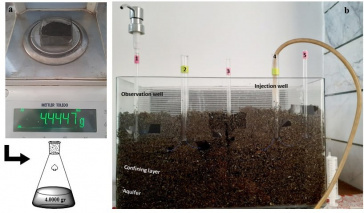Water Purification Breakthrough: Nanoparticles Reduce Contaminants in Water

According to a press release from the University of Birjand Public Relations and Information Department, Raedeh Shemshirgaran, a young researcher at the university, has been diligently researching the effects of "supported zero-valent iron nanoparticles on biochar and polyvinylpyrrolidone" in reducing water pollutants. Shemshirgaran, who started this research during her master's program in the field of nanomaterials, achieved noteworthy results in water purification through laboratory-scale experiments, under the guidance and support of experts in the field.
During her research, Shemshirgaran examined the impact of the mentioned nanoparticles on reducing contaminants in groundwater on a larger scale in the Hydraulic Laboratory of Birjand University's Civil Engineering Department, with guidance from Dr. Abolfazl Akbarpour. This research yielded considerable results in reducing water pollutants.
Shemshirgaran emphasized that one of the challenging aspects of water pollution reduction is the overall cost of purification methods and equipment, as well as the formation of secondary pollutants, which hinders effective water and wastewater treatment. She highlighted that her work with zero-valent iron nanoparticles has proven to be cost-effective, readily available, and highly efficient, which has motivated her to continue her research. She also noted that this process, supported by the advanced catalytic properties of iron nanoparticles, has extended to addressing wastewater from mines, showcasing excellent results in reducing mineral pollutants in lab-scale experiments.
The young researcher further emphasized that the use of the aforementioned nanoparticles reduces the costs associated with water and wastewater treatment compared to other methods, while also lowering the production of secondary pollutants and energy consumption. Research areas involving the application of nanoparticles for reducing various water and wastewater contaminants continue to expand and grow. It is hoped that Birjand University will support and encourage students interested in pursuing this path.
Nanotechnology has emerged as a significant challenge and a rapidly growing field in modern life, demonstrating remarkable progress in recent years. Nanotechnology also plays a pivotal role in the development of advanced economies, contributing to the creation of new platforms and empowering competitiveness in existing industries. Furthermore, it has the potential to bring about remarkable growth and transformations in vital sectors of the country, including the water and wastewater industry.
